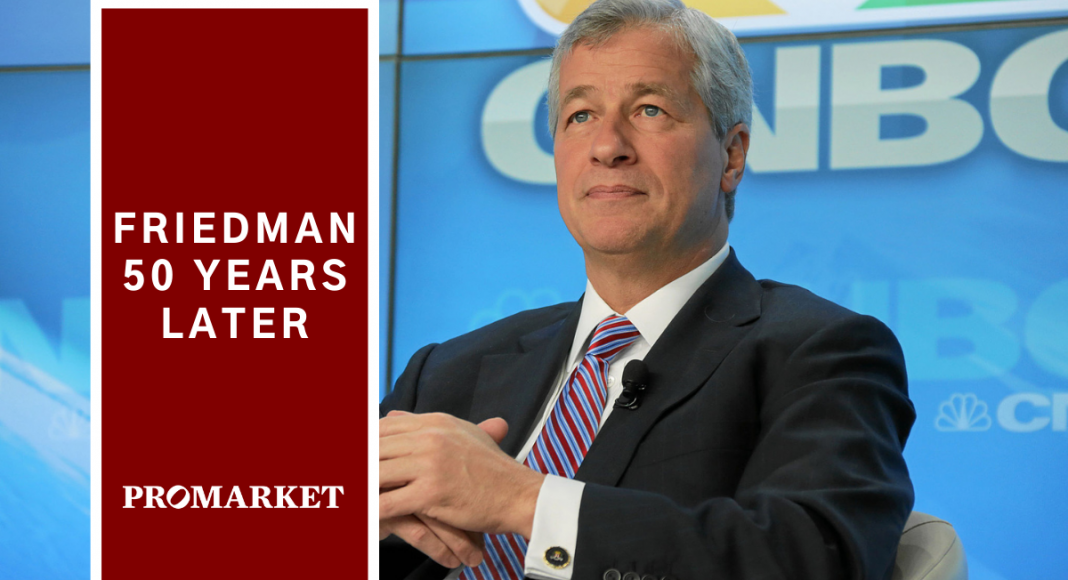Encouraging corporations to further step into the role of governments and civil society groups by becoming more “socially focused” risks greater depreciation of our public institutions. What we need instead is a moratorium on corporations setting the rules of the game.
Editor’s note: To mark the 50-year anniversary of Milton Friedman’s influential NYT piece on the social responsibility of business, we are launching a series of articles on the shareholder-stakeholder debate. Read previous installments here.
It is somewhat fashionable these days for CEOs to speak about “stakeholders.” Last year, the Business Roundtable, arguably the most powerful agglomeration of big business in America, abandoned its longstanding shareholders-first policy, ostensibly in favor of a less-rapacious approach towards the environment and labor.
On the surface, this shift looks like good news, and, as with Blackrock CEO Larry Fink’s now-famous 2018 memorandum calling on corporations to have “a sense of purpose,” the Business Roundtable statement received some cheerful coverage in the press.
Yet conspicuously absent from these platitudes about sustainability, ethics, and fairness is any commitment to changing the way companies lobby to set the “rules of the game.” One of the main reasons why so many big US companies today are feeling the heat to be seen as “socially responsible” is that they have spent the last forty years manipulating public policy to serve their interests, to the point where the country’s ability to govern is now so withered that capitalism itself is teetering. In this moment of populist reckoning, let us then not allow half-measures to fool us.
Just as significantly, let us beware of a cure worse than the disease. It is tempting, seeing liberal democracy at its nadir, to heed an attempt at rescue from big business. Perhaps, in recommitting themselves to all their stakeholders, we might hope that the Business Roundtable will save America from angry, underpaid crowds. But nowadays, ever more so, corporations are designed to turn a profit, and in an increasingly cutthroat globalized economy—facing competition from China, India, and elsewhere—this is a good and useful thing for American businesses and, under the right circumstances, for American society.
The idea that corporations have responsibilities to citizens, customers, and employees is eminently sensible—but those responsibilities are usually met if corporations focus on creating long-term value for shareholders.
Conflicts sometimes arise when managers are incentivized to generate short-term returns, either to satisfy transient investors looking for a quick buck or to boost their own bonuses before cashing out. Addressing this mismatch in horizons has been the dominant focus of corporate-governance experts for many decades now. This work should obviously continue.
But the real challenge with corporate social responsibility, or CSR, is posed when purported corporate responsibilities to citizens, customers, and employees are at odds with responsibilities toward shareholders, even over the long-run. For instance, what should happen when it is in the best interest of shareholders to shut down a cash-bleeding factory that is a major local employer?
Corporations in so-called stakeholder economies—Germany and Japan, for example—are generally expected to address this question in favor of their broader social responsibilities. And indeed, even after decades of economic stagnation, many Japanese corporations continue to consider it their duty to protect the implicit covenant of lifetime employment.
Not so in corporate America, and not particularly since the 1980s. Why?
In 1970, Milton Friedman wrote in the New York Times Magazine that “the social responsibility of business is to increase its profits.” The article struck a nerve, and it had a titanic impact, largely because it was timely. Friedman was responding to what he saw as a deteriorating competitive environment in the US, where major corporations were becoming, so to speak, fat and happy.
Friedman worried that this situation made American business vulnerable to international competition (Japan, at the time, was resurgent). He warned that a business strategy that picks and chooses across competing social responsibilities is wasteful of investors’ capital and opens the door to managerial profligacy and corporate mediocrity. In the long run, no one in the country benefits.
In just over a decade, the Reagan revolution had taken hold in America, and Friedman’s postulate had become policy.
“Evidence from decades past suggests big business will simply use any expanded social role to extract more profit.”
Critics of the American embrace of shareholder primacy often point out that CSR is not incompatible with the US remaining competitive. Witness corporate Germany, they argue. But as tempting as the German model may appear to outsiders, it hasn’t really spared that country from populist disenchantment with its own economy today.
Crucially, America ignored an important caveat in Friedman’s own dictum—that corporations’ social responsibility to increase profits was subject to externally imposed rules of the game. In order to work in society’s benefit, profit-seeking companies require strong non-market institutions to safeguard the conditions for competition, since corporations have little interest in doing so. After all, monopolists earn greater profits than firms in competitive markets.
A recent study of market concentration by economists Jan De Loecker and Jan Eeckhout shows that since 1980, corporate markups over marginal costs—a measure of a firm’s ability to command a price premium in the absence of substitute products—have increased substantially to about 67 percent in 2014. For reference, such markups averaged 18 percent in 1980 and about 20 percent in the period from 1950 to 1980.
If corporations can shape the rules of markets to undermine competition, then such markets will have no legitimate basis in a liberal democracy. This is the world in which we now live, having been delivered here in part by the lobbying of some member-companies of the Business Roundtable.
As such, encouraging such corporations to further step into the role of governments and civil society groups by becoming more “socially focused” risks greater depreciation of our public institutions. Evidence from decades past suggests big business will simply use any expanded social role to extract more profit. What we need instead is a moratorium on corporations setting the rules of the game.
If that sounds Sisyphean, scarier still is the proposition that business leaders like Jamie Dimon—who leads both the Business Roundtable and JPMorgan Chase, one of the most-fined companies in history—are serious about being socially responsible. If corporate titans are not constrained by the principle that their actions should be value-accretive to shareholders, expect more rapid erosion of liberal democracy, as they use their political power to subject us to their own idiosyncrasies on what is socially desirable.
Editor’s note: This article is an excerpt of a longer piece by the author recently published in the California Management Review.







